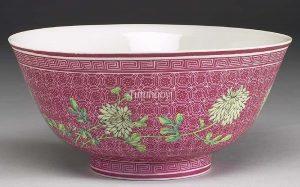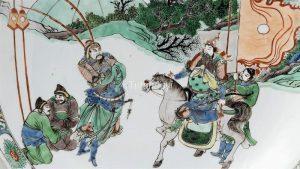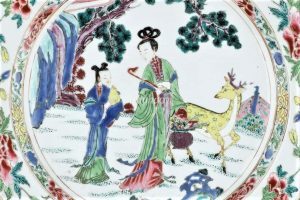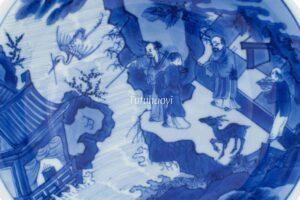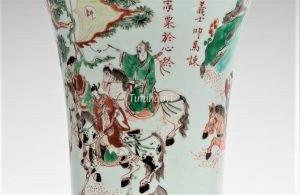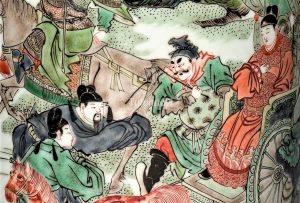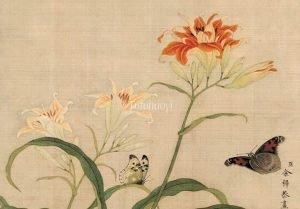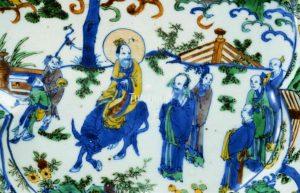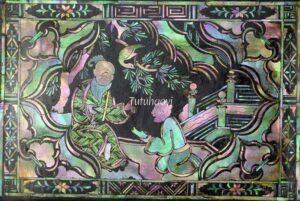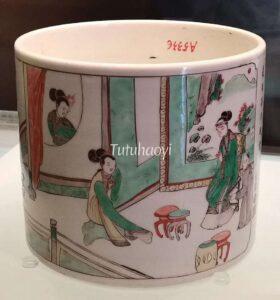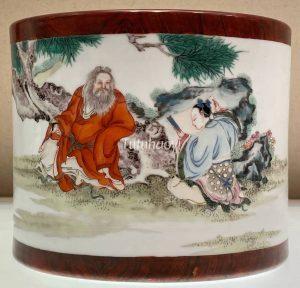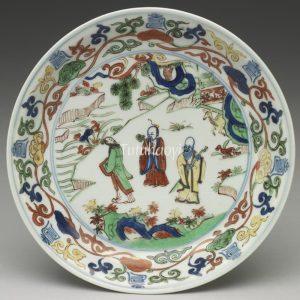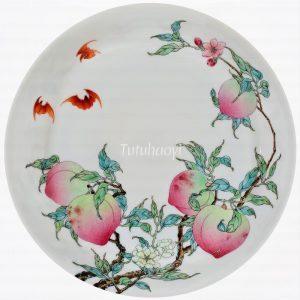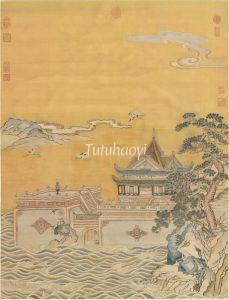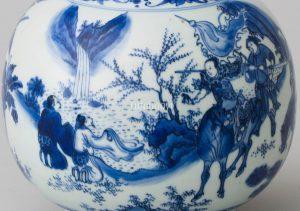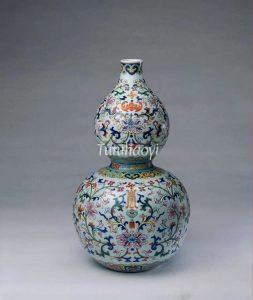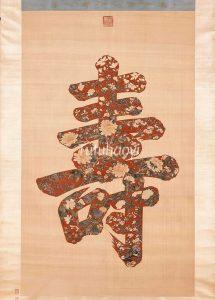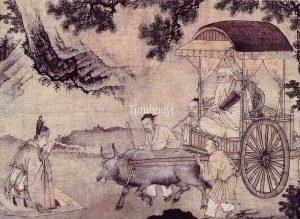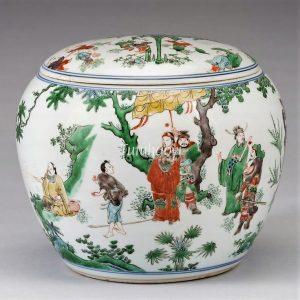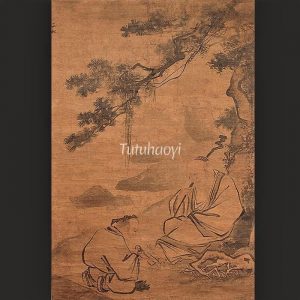Showing Results Containing
The ninth day of the ninth month is a special day in the Chinese lunisolar calendar. According to the Classic of Changes (易经 Yi Jing), ‘nine’ is a Yang number, and the ‘Double Ninth Day’ is considered auspicious and should be celebrated as a ‘Doub...
General Guo Ziyi deterring the mighty enemy has been a famous event in ancient China around mid-8th century. Deciphering this story scene on Chinese porcelain plates and tiles, however, has not been straightforward and has taken iconography specia...
Chinese people deeply respect the elderly and traditionally consider a long existence to be one of the most important blessings in a person’s life. Here are many examples of how artists have combined a variety of longevity symbols to reinforce the...
More often than not, traditional Chinese motifs or symbols are not receiving their deserved attention, being given simplistic or inadequate labels and inaccurate explanations in our museums, catalogues, or even scholarly writing. The treatment of ...
The following article is a discussion of the substitution of a mythical beast for a horse as Grand Duke Jiang’s mount on three classic porcelain vases adorned with the same story scene of ‘Bo Yi and Shu Qi Trying to Stop the Mighty Zhou Army’. It ...
Through analysing a famous theme that depicts Bo Yi and Shu Qi Stopping the Zhou Army, Dr Yibin Ni has compared a number of porcelain vessels from Ming and Qing dynasties, and demonstrated his unique insight which can facilitate the correct dating...
Dr Yibin Ni has discussed the differences of symbolic meanings of lily between Western and Chinese cultures in his unique research, bringing new insight into pictorial art.
Have you ever wondered why images of an old scholarly man riding a buffalo are often depicted on Chinese antiques? What is so special about this man who looks highly respected and followed by yet still sitting on a buffalo’s back? We hereby invite...
Have you ever seen such an image and wondered why a young man is holding a shoe and kneeling down in front of an old man? Is there any historical event relating to the shoe and such scene? Read on to see how Dr Yibin Ni deciphers the figures and s...
This is from Scene Two of Act Four of the Chinese popular drama Romance of the Western Chamber (西厢记 Xixiang Ji).
Miss Cui Yingying 崔莺莺 and Zhang Junrui (张君瑞, also called Scholar Zhang 张生) were deeply in love. Yingying’s maid, Hongniang 红娘, frequently escorted her to Scholar Zhang’s study Continue Reading
The true name of Guiguzi (鬼谷子) remains unknown due to insufficient historical records, although some suggest the name ‘Wang Yi’. Legend has it that Guiguzi was a figure from the Warring States period (475–221 BCE), renowned as both a recluse and a political thinker, strategist, and Daoist. He is considered the founder of...
Zhang Liang (张良, d. 189 BCE) was an ambitious young man and was looking for opportunities to overturn the emperor at that time. He ran into a guru strategist Lord Yellowstone (黄石公 Huang Shigong) by the Yi Bridge 圯桥, where Lord Yellowstone tested Zhang three times for his humility and perseverance before taking h...
The figures of Three Star Gods are personified representation of Good Fortune, Prosperity, and
Guo Ziyi (郭子仪 697–781), a native of Huazhou 华州 (a county near present-day Xi’an 西安), was the most prominent general-statesman of the Tang dynasty. For the great part of nearly thirty years and under a succession of four different emperors, he played a key role in maintaining the stability of the country. He helped to
Guo Ziyi (郭子仪 697–781), posthumously bestowed the title Prince Zhongwu of Fenyang (汾阳忠武王) because of his birth place and his contribution to the court, was the greatest Tang-dynasty general. He played the key role in military campaigns against the Uyghur Khaganate and Tibetan Empire, enemies constantly threatening China ...
In this scene, there are several Chinese longevity symbols such as the
Bo Yi (or Boyi, 伯夷) and Shu Qi (or Shuqi, 叔齐) were sons of the ruler of Guzhu (孤竹), a vassal state of the Shang dynasty (商朝, 16th-11th cent. BCE). As the king was getting old, he wanted Shu Qi, his youngest son, to inherit his throne. However, when the father died, Shu Qi asked Bo Yi to take over th...
When swastika is combined with the Chinese character Continue Reading
The Chinese deeply respect the elderly and consider a long existence – ideally accompanied by health and happiness – to be one of the five most important blessings (wufu 五福) in a person’s life, which were believed by the ancients and recorded in the Book of Documents 书经 in the Zhou Dynasty (...
The peach fruit usually symbolises longevity or immortality in Chinese pictorial art. The origin of this idea started from legends dating back to the third century. Read Dr Yibin Ni...
Laozi (Lao Tzu 老子) is a great ancient Chinese thinker, to whom a five-thousand-character book ‘Dao de jing 道德经’, or The Scripture of the Way and Virtue, has been attributed. He is regarded as the founder of philosophical Daoism (Taoism), daojia 道家, because of his profound insights to life and t...
When the Baron of the Zhou vassal state (周西伯) did a divination with oracle bones for his imminent hunting trip, the message came: ‘You will not catch a small bear or a large bear, but a teacher will be presented to you by the divine power.’ After bathing and fasting for three days, the baron arrived at the River Wei, he ...
After Zhang Liang (张良, d. 189 BCE) failed to assassinate the first emperor of China, he changed his name and went into hiding. One day, he ran into Lord Yellowstone 黄石公, a guru strategist by the Yi Bridge 圯桥. The old man could see Zhang’s great potential but he wanted to put him through a series of tests before taking hi...
